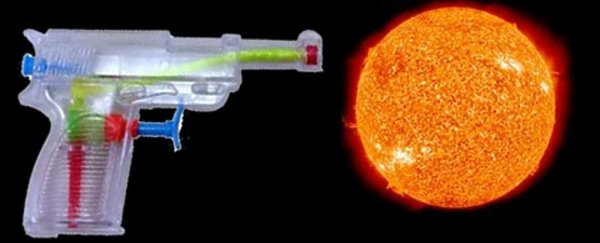
As the laws of physics tell us, things that happen in space don't work quite the same way as in Earth's atmosphere, which means anything we do down here – from shouting across a room to pouring a glass of water – doesn't give us the same results out in orbit. So what about firing a gun?
As Vsauce's Michael Stevens shows in the video above, the answers are fascinating, whether you've got a rifle or a water pistol with you. Shoot a cannon on the Moon, say, and there's a good chance you're going to get hit in the back by your own cannonball. (Not a bad plot twist for the next Hollywood sci-fi blockbuster.)
A lot about this depends on where you choose to fire your gun of choice. As astronauts on the International Space Station (ISS) know, you need to reach speeds of some 8 km/s (5 miles/sec) before the speed that you're falling at matches the speed at which Earth is curving away from you – and that's not a speed bullets can reach.
That's right – astronauts are constantly falling down to Earth. However, despite how fast they're travelling, Earth is falling away from them at the same speed.
On the Moon, it's different. The Moon is smaller and has less of a gravitational pull, so something orbiting the Moon doesn't need to be going at such a high velocity. A very powerful gun, like a military cannon, would be able to fire a shot all the way around the surface of the Moon.
What about firing a gun out in the middle of space? Well, it would simply drift into the blackness, forever alone, while the galaxies around it sped further away. Those galaxies are travelling at around 200km/s (124 miles/sec) as the Universe expands, whereas a travelling bullet can reach speeds of only 1km/s (0.62 mile/sec).
So you can take a shot at the Milky Way – but you're not going to hit it.
Stevens goes on to examine the question we've all thought about at some point: how many shots of a water pistol would it take to put out the Sun?
We won't spoil the answer for you, you can watch the video above to find out, but it's complicated by the fact that the Sun is powered by the fusion of hydrogen nuclei. That means if you start squirting, the Sun is going to get bigger and burn brighter before you can eventually put it out.
A quicker technique would be to somehow blast the Sun into bits so that there's no longer the critical density needed for fusion to happen. In other words, you're going to need more than a few Super Soakers.
And if you think that fire can't burn in the oxygen-free vacuum of space, you're absolutely right. However, modern ammunition comes with its own oxidiser chemical that can trigger the explosion of gunpowder, so all this space-bound gunplay kind of makes sense (sort of).
